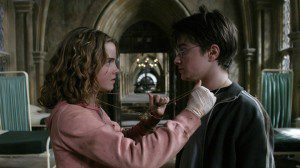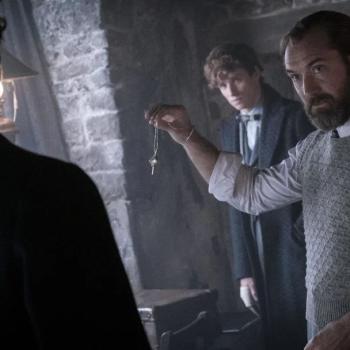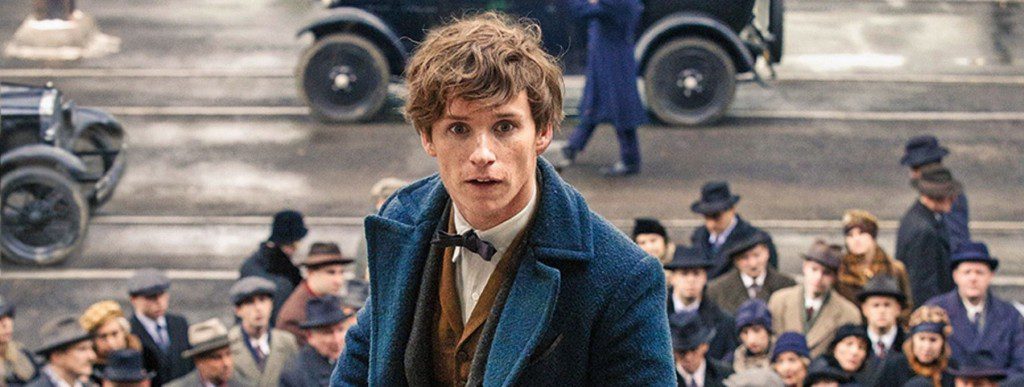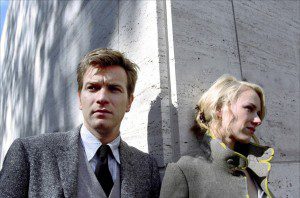 The children, they grow so fast. Harry Potter and the Prisoner of Azkaban is the tale in which J.K. Rowling’s young orphan wizard becomes a teenager, and the first thing that strikes you about the new movie is how much more mature its protagonists have become, at least on the outside; the boys’ faces are leaner, longer, a bit more rugged, definitely free of baby fat, while it seems Hermione Granger (played by Emma Watson), the one girl of any import, is about to blossom into an adolescent beauty.
The children, they grow so fast. Harry Potter and the Prisoner of Azkaban is the tale in which J.K. Rowling’s young orphan wizard becomes a teenager, and the first thing that strikes you about the new movie is how much more mature its protagonists have become, at least on the outside; the boys’ faces are leaner, longer, a bit more rugged, definitely free of baby fat, while it seems Hermione Granger (played by Emma Watson), the one girl of any import, is about to blossom into an adolescent beauty.
This physical maturity is matched by a darker thematic and artistic sensibility. Unlike the first two films, which were directed in a typically clunky, treacly fashion by Chris Columbus, The Prisoner of Azkaban is the work of Alfonso Cuarón, a Mexican whose eclectic portfolio covers everything from the cute-as-a-button kids’ flick A Little Princess to the sexually provocative Y Tu Mama Tambien. Cuarón brings darker colors and bolder, more imaginative visuals to this entry in the series, and for once, it can be said that a Harry Potter film has been made with something resembling a genuine artistic vision.
And just in the nick of time, too. The Prisoner of Azkaban is perhaps the most emotionally complex of the Harry Potter stories to date; it is here that Harry (Daniel Radcliffe) first encounters the Dementors, fearsome creatures which can suck the joy out of anyone who crosses their path, and it is here that he wrestles with his darkest, most murderous impulses. As the story begins, Harry is staying with his mean, muggle (i.e. non-magical) relatives, Uncle Vernon (Richard Griffiths) and Aunt Petunia (Fiona Shaw), and they are visited by the even meaner Aunt Marge (Pam Ferris), whose insulting remarks about Harry’s parents prompt him to retaliate by making her puff up and float away like a balloon. Knowing that his unauthorized use of magic during the holidays ought to get him expelled from the Hogwarts School of Witchcraft and Wizardry, Harry runs away from home and is picked up by a magical double-decker bus that drops him off in the wizarding district. There, he is brought to the Minister of Magic, Cornelius Fudge (Robert Hardy), who surprisingly does not punish Harry but, instead, gives him a place to stay until school begins.
It turns out the authorities are concerned for everyone’s safety — but especially Harry’s — because a criminal named Sirius Black (Gary Oldman), who was sentenced to the maximum-security prison Azkaban 12 years ago for betraying Harry’s parents to the Dark Lord Voldemort, has escaped and is thought to be heading for Hogwarts. The Dementors, who ordinarily guard Azkaban, now patrol the school grounds in seach of Sirius — and while Harry expresses a vengeful desire to kill Sirius himself, he is, if anything, even more terrified of the Dementors. Enter Professor Lupin (David Thewlis), the new Defense Against the Dark Arts teacher, who teaches Harry how to face his fears and resist the Dementors. Lupin, it turns out, is another former classmate of Harry’s father, and in their moments together, Harry begins to form his first meaningful friendship with a grown-up. (The burly giant Hagrid may technically be an adult, but in many ways he’s still a kid at heart.)
The Harry Potter novels have caused a great deal of concern for Christian parents and others who wonder if these books might get children interested in the occult, and of all the stories Rowling has written to date, The Prisoner of Azkaban may supply the strongest evidence for both sides of that debate. Many Christians — and I am one of them — defend the books on the basis that the “magic” contained within them serves the exact same purpose as the improbably high-tech devices that allow sci-fi characters to fly through space, shape-shift, teleport from one spot to another, and so on; as Charles Colson has put it, the magic in these books is “mechanical,” not “occultic.” Within Rowling’s sub-creation (to borrow a term from J.R.R. Tolkien), Harry Potter is not a regular child who dabbles in supernatural powers forbidden to him by God, but rather, he is a child born with an unusual set of natural abilities, and like the mutants who study under Professor Xavier in the X-Men movies, he attends a special school to learn how to master his skills and use them wisely. And nothing has convinced me of the link between Harry Potter’s “magic” and the high-tech wizardry of science fiction more than this story’s introduction of time travel — yes, time travel. Somehow I doubt that’s the sort of thing Wiccans practice in real life, and I suspect most children are smart enough to recognize that that sort of thing is pure make-believe.
But Rowling introduces another concept in The Prisoner of Azkaban that might not be so easy to explain away. In this story, Harry and his friends attend a course in divination taught by the loopy Professor Trelawney (Emma Thompson); exercises include gazing into crystal balls, reading palms, and studying tea leaves. For the most part, Trelawney and her lessons are held up to ridicule — Hermione, the most intellectual of Harry’s friends, dismisses divination as a “woolly discipline.” But the mere existence of this class at Hogwarts, combined with the fact that one of Trelawney’s prophecies is uttered under eerie circumstances and does come true, may be enough to convince some Christians that the Harry Potter stories are up to no good. Spoilers prohibit me from saying more about this, but suffice it to say that Christian interpretations of the Trelawney scenes range from those who think they provide the clearest evidence of demonic activity in Rowling’s world, despite the fact that Rowling has never made demons a part of her sub-creation (see Richard Abane’s Harry Potter and the Bible), to those who think they expose the folly of superstitious beliefs (see Connie Neal’s The Gospel According to Harry Potter).
The deeper problem with these books is their questionable, and highly subjective, morality. The Prisoner of Azkaban does contain at least one noteworthy object lesson in the difference between humility and arrogance, when Hagrid (Robbie Coltrane), the newly appointed professor in charge of magical beasts, introduces his students to a hippogriff (a creature that is half-horse, half-eagle) and tells them they must respect its “pride” if they want to go for a ride on its back; Harry approaches the hippogriff humbly, his neck bowed, and is rewarded with a fantastic flight over the school grounds, while Draco Malfoy (Tom Felton), the school bully, swaggers right up to the creature and is promptly attacked. But Harry’s virtues are lacking in other areas. He exhibits a flagrant disregard for the rules, even when they have been put there for his own safety, and nearly always seems to get away with it; it is also particularly disturbing to see the “heroes” of this story, including Harry himself, so eager to kill the man who betrayed Harry’s parents. Harry manages to exchange his anger for mercy at the last possible moment, but his change of heart seems more like a passing whim than the result of a deeper transformation in the way he thinks and feels.
That change may yet come. The Prisoner of Azkaban is the third in a projected seven-part series, and it is too early to say where this character’s arc will take him in the end. What we can say at this point is that Cuarón has produced the most terrifying and darkly humorous movie adaptation of Rowling’s stories to date — his use of the Whomping Willow to convey the passing of the seasons is especially amusing — and he has given it a visual flair that was sorely missing in the previous installments. The Dementors are especially creepy — not quite as frightening as the Nazgul at their worst in Peter Jackson’s Lord of the Rings films, but more consistently scary than Jackson’s creations, which occasionally seemed like the actors in costumes that they were. Most remarkably, despite the fact that he was adapting the longest of the first three books, Cuarón has turned out the shortest and most briskly paced film of the lot. If anything, the film may be too brisk — it leaves out a fair bit of material, particularly regarding Harry’s father and his friends, that could have clarified the connections between certain characters and objects. But overall, this film is perhaps the most entertaining opportunity that children and adults have had yet to practice their gifts of discernment in all things Potter.
3 stars (out of 4)
–
Talk About It
Discussion starters
1. What do you think of the “magic” in these stories? How is it similar to, or different from, the sort of “magic” that some people try to practice in the real world? How is it similar to, or different from, technology? Why do you think people like to imagine doing impossible things? What sorts of powers do you wish you had?
2. Are Harry Potter and his friends receiving the sort of moral instruction they need to guide them as they apply their lessons in “magic”? What sort of classes would you like to see Harry and his friends take, which (so far) have not been seen at Hogwarts?
3. If you could go back in time, would you? To when? What would you do? What implications do time travel and prophecies like Trelawney’s have for free will? Does knowing the future limit Harry’s choices, or expand them?
4. Does the movie criticize or support superstitious beliefs? Is it possible to mock an activity and encourage it at the same time? Does the movie itself do this?
5. Who do you think would make the best father figure for Harry? Why? Professor Lupin tells Harry that his father, James Potter, broke a lot of rules, too. What kind of father do you think James would have been to Harry? Do you think anyone ever disciplines Harry properly or effectively? Who does Harry respect in this story? Why does he respect them?
The Family Corner
For parents to consider
The film is rated PG for “frightening moments, creature violence and mild language.” The Harry Potter stories have been the focus of debate because they are about children who are born with “magical” powers — some of which, such as the ability to ride broomsticks, are clearly just make-believe, though others, such as the ability to predict the future, may resemble forms of divination that the Bible forbids in real life. The threat of violence also looms large over these stories — Harry’s parents were killed when he was one year old, and both he and a couple of adults express a desire to get revenge against the person who betrayed his parents. In addition, the Dementors are very creepy creatures that try to suck out the souls of a couple characters. The characters also occasionally use words like “bloody” and “damn.”
— A version of this review was first published at Christianity Today Movies.












